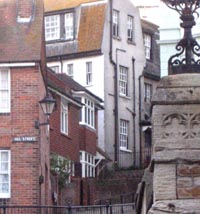The Crimson Garter is available at Amazon.com and at Kobobooks.
Stanley Moss is travel editor of Lucire. He has authored numerous books, including, recently, The Hacker.
Chapter 15
‘I should very much like to continue,’ Mr McGowan said. ‘But the reading of a will is most taxing. Mr Cribbs and I will now repair to the kitchen for a bit of refreshment, and upon our return we will give you details of the assets.’
‘By my calculation,’ Sir Robert sneered, ‘There will be little left to detail after the bequests are paid. Since I do not care to delude myself, make haste with your meal and return to me as soon as you can. Bad news is best served warm.’ With looks of great disappointment the lawyers hurried off to the kitchen and left Marsh alone at the long table once more. He had barely a minute to himself before Cedric ushered in Dumble and Pym.
Mr Dumble carried under his arm a large roll of paper, which proved to be architectural drawings, and he spread them out with great enthusiasm on the table in front of Sir Robert. Mr. Pym struggled with various samples of marble, granite and limestone, which he used to weigh down the corners of the large drawings, which attempted to curve upward with a strange persistence. A succession of drawings of incredible filigree shuffled past Marsh’s eyes, while Dumble waxed eloquent about the artistic details of the church, the statuary likeness of Lady Dorothea as the patron saint of children, which would be mounted in an alcove above her tomb, the leaded glass window depicting her charity and nobility. Pym shoved cubes of hefty stone at Sir Robert, enamoured of the striations and crenellations until Marsh could take it no longer. He instructed Cedric to show the men out, and demanded that they henceforth communicate with him in writing.
Next Cedric escorted in the Bishop, who repeated that Lady Dorothea would be remembered for her piety and generosity, and that he, the Bishop, could be counted on to mention all of her worthy charities in his eulogy. That the Orphans of Bedrachen had prepared a special choral interlude for the funeral. Was there anything in particular Sir Robert would like to have included in the sermon? That the villagers planned a great floral tribute, and a long processional, and it was bound to be an emotional event for the entire community. Perhaps Sir Robert would like to prepare a few appropriate words to read over his mother’s tomb?
Following the Bishop, Cedric urged in a wiry little man whom Sir Robert had observed seated in the foyer. The man was fastidiously dressed in all black from head to toe, with a preposterously large black bow at his neck. He kept his high top hat on at all times. The man had sat there motionless, and he placed himself across from Sir Robert, as still as a small reptile, which he resembled, moving only his mouth, and speaking in a barely audible voice.
‘I am Kilmarin, the undertaker, sir,’ he began. ‘And you will accept from me—I am sure—my enormous condolence for your unthinkable loss. Such a saint your mother was, and greatly beloved by all who knew her. But always realistic, for she knew that one day, as for all of us, her time would come to take her leave, and she made plans so that her passage from this world and into the next would cause the least heartache to those closest to her. She had spoken to me at length as to how she wished her memorial to be made. And the housing for her mortal remains, and where she wished to rest. Your mother selected all the floral arrangements, and Molly has assured me she has found the gown for the dear departed, and be assured your mother will look as lovely as the day she was wed. Her features will have a youthful flush, and there will reside an expression of incredible peacefulness upon her face, this much I promise you.’ The man began unconsciously to wring his hands together, and Sir Robert could not tell whether it was nervousness or satisfaction that the gesture communicated. ‘Your mother, in her great modesty, selected a beautiful ebony casket, but I wonder, my lord, if, given her magnanimity, would it not appear pauperish—forgive me—to inter her in such a dark and spiritless container? Might you not sir, could I not show you, other magnificent caskets the Lady Dorothea might be more comfortable resting in. In this first drawing I offer you a cast copper marvel, zinc plated inside—to better preserve her remains—lined in red velvet, and will require two fine dray horses which we can supply, garlanded with sombre black feathered headdresses to assist in the transit to her final resting place.’ The man could not be stopped, so enthusiastic was he, and he became more energetic and animated the longer he spoke. ‘Here I have for you an elegant marble sarcophagus, rendered in the antique Romanesque style, with carvings on all sides, representing biblical motifs which refer to her saintly life: the Good Samaritan, the Story of Ruth, the Casting of Bread upon the Waters. So beautiful!’ Mr Kilmarin sighed, and took stock of Marsh’s disbelieving expression. ‘At the corners a pair of cherubs to guard her,’ he added. ‘And at her feet, two snow white doves, as in Shakespeare. Only this last rendering, please Sir Robert, only a moment more, represents the casket she had originally ordered, but as you can see it is quite simple and modest, spare, frugal, and perhaps not befitting of one as admirable as Lady Dorothea, not to mention a trifling tribute of a son’s love for his mother. I beg that you consider a more eloquent …’
‘Enough!’ Sir Robert shouted. ‘I will have none of these other monstrosities. The Lady Dorothea’s original choice stands, now out of here with you. I have heard quite enough. I will respect my mother’s wishes. You are dismissed. Cedric!’
No sooner had the undertaker quit the room than the lawyers returned. They appeared much revived, for somehow the kitchen had produced meat pies and ale, and they were flushed and eager to go back to work.
McGowan settled his spectacles on his nose, cleared his throat and reached for the first document on the stack at his left elbow. ‘It may surprise you that your mother has made some—I might say—bold and unorthodox investments over the years. Investments of which we were not always in favour, but today it seems the Lady Dorothea possessed that inexplicable intuitive skill where, more often than not, bountiful fruit was borne from exotic seeds sown, much to our surprise.’
‘I am not understanding this,’ Sir Robert interrupted. Do you mean to say …’
‘Let us begin close to home,’ McGowan went on, for he was slightly deaf, and often chose to ignore his clients when he had not completed his thought. ‘As you are no doubt aware the potato crop has been most rewarding for the past ten years, and so your family has benefited handsomely from its share of the income.’ Mr McGowan grabbed for the next document in the stack. ‘The village of Dingwall, under the stewardship of Mr Brown, continues to turn a handy profit from the tenant farmers’ yearly revenues. Of the 683 households where Lady Dorothea holds the liens, more than 80 per cent are current.’ Here the lawyer held up a hefty group of assorted documents, around which was wrapped a faded blue ribbon. ‘Your mother’s policy of compassionate collection was well known among her tenants, and they rewarded her with their timely remittances over the years. It alone has left you a man with a comfortable fortune.’
The lawyer went on along these lines for a good while, as Sir Robert struggled to stay awake. McGowan’s droning voice, the musty smell of the documents, the endless reciting of figures, property lines, witnesseths and names drove Marsh towards sleep, so he occasionally found his chin resting on his chest, and more than once he allowed himself the satisfaction of a momentary dream. There eventually came a moment where Marsh jerked himself awake in the middle of a long sentence uttered by Mr McGowan, when it occurred to Sir Robert that the rugged island in the Western Isles, on which he summered as a boy, in whose bracing waters he swam, in whose pristine streams he fished, was revealed to be owned in its entirety by his mother. As he puzzled in vague disbelief at that notion that he now owned an island in the Hebrides, the lawyer reached for another document from the endless stack and mentioned in passing the yearly revenues of his mother’s coffee plantation in Cameroun, a startling disclosure of which Sir Robert had heretofore known nothing.
By far the most staggering revelation concerned the condition of a diamond mine in Southern Africa, which, McGowan happily ventured, placed the value of Sir Robert’s holdings in the realm of the stratospheric. The figure the lawyer named made Sir Robert steady himself on the tabletop, cocking his head, dumbstruck, disbelieving. After years of self-denial and parsimonious living, he could hardly fathom the size of his mother’s estate, which now was his. Could it be valued at such a magnificent sum? It meant he could now afford any of the comforts, which he had always as a rule denied himself. He wondered whether such vast sums truly made a difference. Could they bring back his errant wife or departed mother? Could they answer the mystery of whether the artist Balthazar had stolen Grace, could they obliterate the scandal surrounding The Crimson Garter? It remained to be seen.
Hours later, when night had finally fallen and the manor house stood empty and deserted of the throng, Sir Robert found himself alone at last in his study. Weary, and still reeling from the revelations made to him that day, he sat at his desk staring at a large pile of mail, which had accumulated in his absence. While his body was weak, his mind remained active, and he decided that before going to sleep he would examine the stack in a cursory way, to at least determine if any pressing business required his immediate attention. He found the usual letters from booksellers, stray appeals from correspondents who often petitioned him for preposterous causes, and near the bottom of the pile an unusual letter from his Paris bank, and it caught his attention immediately. He had expected no correspondence from this particular bank, but the situation with Grace’s disappearance and his suspicion that she had returned to Paris caused him to rip open the letter frantically, in hopes that it contained some shred of useful information.
What he found further astounded him, for the envelope contained a bank draft, advising him that an unusually large sum of money had been anonymously placed in deposit in his account, and while the source was a London bank unknown to him, the even odder detail listed a larger sum than the principal amount, legended as ‘accumulated interest’, and it had been further credited. At first Sir Robert snorted in disgust, believing that the bank had acted in error and that some poor fool would doubtless discover his money had been maldirected, and that some inept clerk was soon to be shown the door, and good riddance to him. But when Marsh re-read the principal amount it dawned on him that the figure was exactly the sum he had advanced Vittorio Rosetti so many years earlier. Marsh sat up straighter in his chair. The restitution had been drawn from a London bank. Suddenly his suspicion was aroused: could there be a connection between the repayment of Rosetti’s debt and the various perturbing developments which had commenced with his arrival in London? Had Vittorio Rosetti returned, and could he have orchestrated the litany of calamities which culminated in Grace’s disappearance? Marsh closed his eyes, and unconsciously clenched and unclenched his left fist. What if there was some sinister connection between Vittorio Rosetti, the painter Balthazar, and the painting of The Crimson Garter? Absurd! The man had been gone, believed dead, for seven years. Never a word from him. But before such idle speculating, Marsh would need to find out first the source of the deposit, and he would need to inquire in person at the London bank to get the answer. From there he would need to proceed to Paris, locate Grace, for where else would she be, and bring her back. The funeral of the Lady Dorothea would be over in two days, and then he could leave. He pulled the letter from his pocket, the one which Grace had left for him at the Cringley Arms, and he re-read it for the hundredth time. He was certain that Paris was the only place which could lure her away from him with such magnetism. If she was not at the Opéra, then he knew the person to whom she would turn: Madame Montichka. How distasteful, he thought, that it would entail the necessity of enduring another bothersome interaction with the sordid world of the theatre.
If you wish to read ahead, The Crimson Garter is available at Amazon.com and at Kobobooks.
Related articles hand-picked by our editors
 Off to London, Lisbon,
Livorno, Lille, Lahore
Off to London, Lisbon,
Livorno, Lille, Lahore
Travel editor Stanley Moss updates us on his wanderings, brought
to you by the letter L
photographed by the author
 Two Parisian hideaways
Two Parisian hideaways
Stanley Moss looks at two distinctive Parisian hotels on opposite sides of town, with very different characters
photographs by Paula Sweet and courtesy Hôtel Le A
 Rich in its memories
Rich in its memories
Stanley Moss takes in St Leonards-on-Sea, a charming seaside hamlet
in East Sussex rich in history
photographed by the author
Advertisement
Copyright ©1997–2022 by JY&A Media, part of Jack Yan & Associates. All rights reserved. JY&A terms and conditions and privacy policy apply to viewing this site. All prices in US dollars except where indicated. Contact us here.